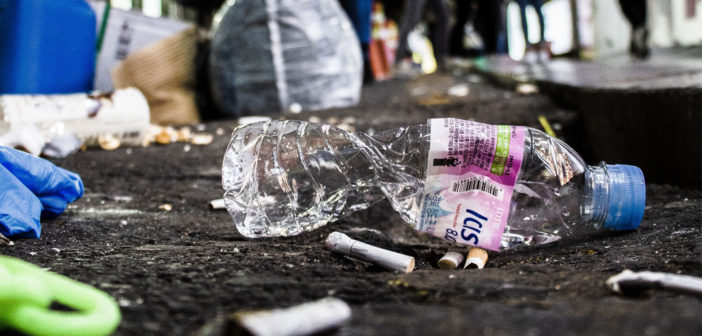“It’s just different.”
These insightful words were imparted to me by my gay narcissistic ex many times when I asked why exactly he left me for someone else. And when I asked this question (far too many times), I was anything but poised. It’s plenty accurate to say I was a slobbering mess who spoke with a quaking voice and stared pleadingly with watery doe eyes.
The response was always the same. Time and again it was the lazy and vague reminder that there was some special quality that my gay narcissistic ex found in someone else—something I failed to provide. It wasn’t explicitly said in the beginning, but the implication was there. There was an intangible magic the new partner worked on the ex gay narcissist.
He could never explain it in detail. All he ever came up with was…
“It’s just different.”
Fresh, New Supply
I now know what the magical ingredient of “just different” is, of course.
It’s fresh narcissistic supply, and that fresh narcissistic supply is provided by the new partner—or the “new supply” as these individuals are usually called by those familiar with narcissistic relationships and the discard phase.
Do me a favor and give your imagination a workout for a moment, won’t you? Imagine a narcissistic person who is, dare I say, shallow and thrill-seeking. You see, the gay narcissist from my past lived for the thrill of fresh attention from people he didn’t know, and it was all the more intoxicating when it came from other men.
This attention provided hits of fresh narcissistic supply, and there’s no narcissist who is not on the constant hunt for fresh supply. It’s the vampire forever stalking the world at sunset for the warm blood of unsullied victims. It’s a tired analogy, but it’s also an apt one.
The vampire is a predator forever hunting for victims to feed upon for survival. And he has an arsenal of supernatural powers at his disposal to aid him—mind control, shapeshifting, and the creation of thralls from his victims. Charm and mirroring and flying monkeys, anyone?
And every Dracula will eventually find his Mina. So, too, will every narcissist eventually find a new romantic interest. The new supply provided is just too fresh and to energizing. The invigoration it gives the narcissist jolts him into ecstasy like something he hasn’t experienced in a long time… probably since he initially met you.
But Is The New Supply Better?
For months I asked myself why I was inferior to my gay narcissistic ex’s new boyfriend (someone he started referring to as his “partner’ in mere weeks).
The narcissistic discard I experienced left me dizzy. It was a Herculean task to get out of bed in the morning. I barely got through my daily tasks at work, let alone producing anything of value. My appetite didn’t exist. I lost over 40 pounds in a couple of months (the only thing I miss from the experience). At the end of every day I’d lay in bed wondering what I did so wrong and what flaws in me were so great that I could so easily be discarded and replaced by the new supply.
As I look back on these times with a few years of experience, I’m nauseated by the amount of blame I foisted upon myself. I attributed so little to the shitty actions of the ex gay narcissist.
I was never really a partner to this person. I was his supplier of attention, validation, and stability when his legion of deep and exhausting insecurities took hold. His impulsiveness and erratic decisions were all-consuming and absolute, and those affected in their wake be damned.
But I considered none of that in the initial months of the gay narcissistic relationship ending. All I cared about were my failures and comparing them to the triumphs of the new supply. For surely he was better, right?
He wasn’t.
The new supply was a provider of fresh attention and validation. He was a vehicle for new opportunities of excitement and stimulation.
The weekend could never end. The party must always go on. The mundane responsibilities of life are enough to cause an emotional collapse for a narcissist. Extensive and exhausting emotional support from a partner is the cost of resuscitation.
I represented responsibility and obligation at the narcissistic relationship’s end. The new supply represented excitement and freedom. I didn’t “stand a chance” (the exact words spoken by the ex gay narcissist at one point).
In a way, the words were true—“it’s just different.”
That which was different was all that mattered. A different source of narcissistic supply providing an intoxicatingly fresh buzz. None of this was about the people and relationships involved. It was all about a proverbial addict getting his proverbial fix.
But as “different” as the new supply was, it was still destined to end like all the other relationships in this gay narcissist’s life.
Failure.
* * * * *
If you’re interested in learning more about narcissism, toxic relationships, dark personalities, and sexuality, then I highly recommend the books below.
Please consider buying through the provided Amazon Associate links. While the content on my website is yours to read for free, I do appreciate any support offered toward my work.
The reading list includes:
Should I Stay Or Should I Go: Surviving A Relationship With A Narcissist (Dr. Ramani Durvasula)
The Human Magnet Syndrome: The Codependent Narcissist Trap (Dr. Ross Rosenberg)
The Sociopath Next Door (Dr. Martha Stout)
Without Conscience: The Disturbing World Of The Psychopaths Among Us (Dr. Robert D. Hare)
In Sheep’s Clothing: Understanding And Dealing With Manipulative People (Dr. George Simon)
Being Homosexual: Gay Men And Their Development ( Dr. Richard Isay)
The Velvet Rage: Overcoming The Pain Of Growing Up Gay In A Straight Man’s World (Dr. Alan Downs)





2 Comments
In my experience, as an NPD who has done what I can do in order to cease being toxic, I’ve found that the allure of “new supply” comes from some specific places, primarily.
First, to feed the ego and secure supply, we must always feel – and- look perfect. Perfection is, yeah, an illusion, and not to mention arbitrary, so when someone (as a narcissist) spends more time with their partner in more and more varied situations, they begin to notice all kinds of stuff that isn’t 100% aligned with their specific idea of a perfect man, and if they’re not with a perfect man, this will really hurt. So, because the perfect look, personality, or whatever doesn’t exist, and the average NPD person exists without a stable and integrated sense of core self-value, when we notice that lack of perfection it cuts deep and feels like a Mortal wound. It really does feel like a hole in a ship or something, like a dire and immediate problem.
A new supply is fresh and clean from memories of “imperfection, ” and this becomes a lifeline to freedom from that feeling of normalcy or fallability. And that’s literally just it, at least in my experience. I’ve always been fairly mild in toxicity, and it seems as though more overtly cruel or malicious narcissists may have some other operant motives here, but yeah.
I’ve found that a healthy level of comfort with my own flaws (and I mean the awkward cringe flaws which are humiliating, and not just the sexy-Halloween-devil flaws) is what provides the grace I need to keep loving a man who I’ve seen acting goofy in a way I don’t wanna be seen with, or otherwise violating one of my (many) cardinal rules. The urge to degrade and discard definitely seems to be directly tied to one’s (lack of) ability to tolerate failure-of-image within the self.
This is just my take though, and that bears repeating because NPD tends to be discussed as a single experience, or a monoperson, and from what I’ve seen, there is just enough nuance between abusive people to make this essence of uniformity into a dangerous assumption.
Thank you for taking the time to comment with all of your insight, Theo, and yes, I hear what you are saying.
It became very clear when I was not measuring up to the check list my ex had in his mind, it was triggering this image he had of what perfection should be and how that was falling short.